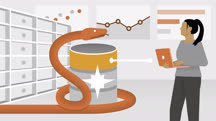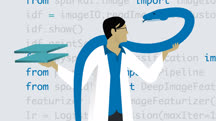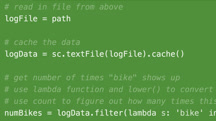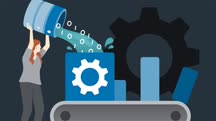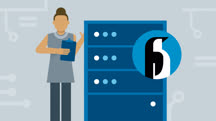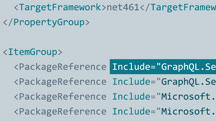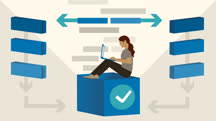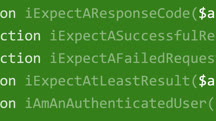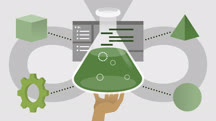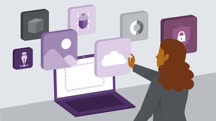Course catalog
Categories
Showing 641-660 of 8,871 items.
Apache Flink: Real-Time Data Engineering
Discover how to build a real-time stream processing pipeline with Apache Fink. Learn about the platform's windowing, event-time processing, and state management features.
Apache Kafka Essential Training: Building Scalable Applications (210542)
Scalable and distributed message queuing plays an important role in building real time big data pipelines. Asynchronous publisher/subscriber models are required to handle unpredictable loads in these pipelines. Apache Kafka is the leading technology today that provides these capabilities and is an essential skill for a big data professional. In this course, Kumaran Ponnambalam provides insights into the scalability and manageability aspects of Kafka and demonstrates how to build asynchronous applications with Kafka and Java. Kumaran starts by demonstrating how to set up a Kafka cluster and explores the basics of Java programming in Kafka. He then takes a deep dive into the various messaging and schema options available. Kumaran also goes over some best practices for designing Kafka applications before finishing with a use case project that applies the lessons covered in the course.
Apache Kafka Essential Training: Getting Started (210508)
One of the key components of a big data processing pipeline is a scalable and distributed message queue. Message queues enable real-time streaming capabilities with multiple producers and consumers of data. This enables real-time applications that can analyze data and produce insights in a scalable fashion. Apache Kafka provides these capabilities. As the de facto standard for open-source messaging, Apache Kafka is an essential skill for data scientists, big data engineers, data architects, and solution architects. In this course, instructor Kumaran Ponnambalam introduces Apache Kafka and explains its fundamental concepts and basic operations. Kumaran covers basic concepts like messages, topics, logs, and more. He shows you how to use the Kafka command line, as well as partitions and groups. He goes over Kafka Java programming, then concludes with a use case project.
Apache PySpark by Example
Get up and running with Apache Spark quickly. This practical hands-on course shows Python users how to work with Apache PySpark to leverage the power of Spark for data science.
Apache Spark Deep Learning Essential Training
Learn how to do deep learning with images on Apache Spark, using the Databricks deep learning library and Python.
Apache Spark Essential Training
Get up to speed with Spark, and discover how to leverage this powerful platform to efficiently and effectively work with big data.
Apache Spark Essential Training: Big Data Engineering
Discover how to make Apache Spark work with other big data technologies to build data pipelines for data engineering and DevOps.
Apache Spark Essential Training: Big Data Engineering (218685)
Data engineering is the foundation for building analytics and data science applications in the new Big Data world. Data engineering requires combining multiple big data technologies to construct data pipelines and networks to stream, process, and store data. This course focuses on building full-fledged solutions that combine Apache Spark with other Big Data tools to create end-to-end data pipelines. Instructor Kumaran Ponnambalam begins by defining data engineering, its functions, and its concepts. Next, Kumaran goes over how Spark capabilities such as parallel processing, execution plans, state management options, and machine learning work with extract, transform, load (ETL). He introduces you to batch processing use cases and processes, as well as real-time processing pipelines. After walking you through several useful best practices, Kumaran concludes with an end-to-end exercise project.
Apache Web Server: Administration
Keep your Apache web servers up and running with these practical configuration and logging techniques.
API Development in .NET with GraphQL
Learn how to use the GraphQL.NET framework to build a GraphQL endpoint. Discover how to create a GraphQL project, configure the schema, allow updates through mutations, and more.
API Test Automation with SoapUI
Learn how to leverage SoapUI to fully automate testing of APIs.
API Testing and Validation
Learn how to validate and test your API to ensure it's working as intended and solving business problems.
API Testing Foundations
Learn the basics of API testing. Discover how to use several robust tools for testing APIs at scale in an organization.
Apollo Client State with React
Discover how to manage client-side state using Apollo with React. Learn how to configure and query client state, mutate client state, mutate the cache, and more.
App Center: Continuous Integration and Delivery for iOS
Learn when and how to leverage Visual Studio App Center to automate and manage the lifecycle of an iOS application.
App Development for Microsoft HoloLens
Learn how to program the future. Get started developing virtual reality and augmented reality HoloLens applications for enterprise business and gaming.
Apple Certified Support Professional macOS 11: 1 Installation and Configuration (218872)
Are you currently a macOS administrator, or do you aspire to be one? If so, this course can help you master some important basics. With a user-friendly, two-host format, ITProTV introduces you to the installation and configuration tasks that must be completed to get started in macOS. This course covers what you need for installation, how to build USB installation media for macOS, actually installing macOS, performing the initial system configuration, adding a printer to macOS, and sharing the printer on a network. This course also helps you begin your preparation for the Apple Certified Support Professional (ACSP) certification.
Note: This course was created by ITProTV. We are pleased to host this training in our library.
Note: This course was created by ITProTV. We are pleased to host this training in our library.
Apple Certified Support Professional macOS 11: 2 User Accounts (219603)
Are you currently a macOS administrator, aspiring to become one, or preparing for the Apple Certified Support Professional (ACSP) certification exam? If so, this course can help you master the information you’ll need about user accounts in macOS. With a user-friendly, two-host format, ITProTV steps you through several types of user accounts, as well as user account security and the Screen Time feature. This course covers local user accounts, iCloud accounts, and special user accounts. Then it goes into how to delete user accounts that are no longer required and how to handle the contents of their home directories. The course concludes with instructions on how to use the Screen Time feature in macOS to control a user's experience and enable, configure, and disable Screen Time for an account.
Note: This course was created by ITProTV. We are pleased to host this training in our library.
Note: This course was created by ITProTV. We are pleased to host this training in our library.
Apple Certified Support Professional macOS 11: 3 Data Management (232625)
Are you currently a macOS administrator, aspiring to become one, or preparing for the Apple Certified Support Professional (ACSP) certification exam? If so, this course can help you master information you’ll need about data management in macOS. With a user-friendly, two-host format, ITProTV shows you several methods for managing your data, keeping it secure, and setting permissions. This course covers storage hardware, file systems, and file system maintenance. It explains FileVault disk encryption and the differences between archives and disk images. The course explains default file permissions, then goes into how you can customize permissions and set special file permissions. After going over aliases, links, and hidden files and folders, the course concludes with the four file domains in macOS and the purpose of each domain.
Note: This course was created by ITProTV. We are pleased to host this training in our library.
Note: This course was created by ITProTV. We are pleased to host this training in our library.
Apple Certified Support Professional macOS 11: 4 Applications and Processes (219586)
The Apple Certified Support Professional (ACSP) certification confirms your understanding of the core functionality of macOS, as well as your ability to configure key services, perform basic troubleshooting, and support multiple users with essential macOS capabilities. In the fourth installment of this course from ITProTV, Don Pezet and Zach Memos cover applications and processes in macOS 11. Don and Zach look at the Apple App Store, as well as the different methods for installing applications and the pros and cons of each approach. They also address application security, how to customize your preferences, how to use and add features to Quick Look, and the different methods of voice control you can use in macOS.
Note: This course was created by ITProTV. We are pleased to host this training in our library.
Note: This course was created by ITProTV. We are pleased to host this training in our library.



